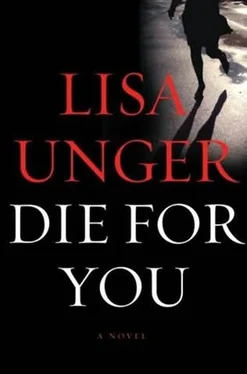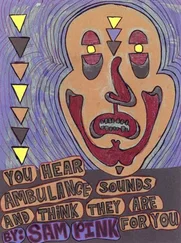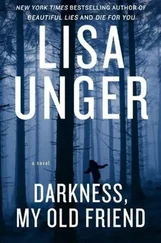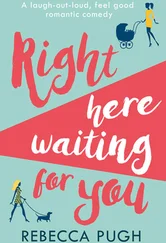I didn’t answer, just stared at the ceiling. He wasn’t looking for an answer. This was his way. Just put it in your pipe and smoke it , he’d say.
“Or is it just about the why and how, Isabel? Is it just about the knowing, the understanding that you need?”
I still didn’t feel compelled to answer.
“Because I’m your friend. I’m with you. I’ll buy the tickets. I’ll get on a plane and go with you wherever you need to go. But let’s make sure it’s for the right reasons.”
“What makes a right reason?” I asked.
“Something that, when bad things happen and it all goes to shit, is still worth all the trouble. Something that means enough to risk everything you’re risking right now.”
I looked at his profile, the crooked ridge of his nose. He seemed tired to me suddenly. I looked around the room and noticed that it was another minimal space, like his office. Just the low platform bed, covered in expensive linens. The walls were white, the floor hardwood. Where was all his stuff? His magazines and dirty clothes, his photographs and unpaid bills? I remembered his dorm room from NYU-a pigsty of staggering proportions. When did he become so neat, so anti-clutter?
“My father didn’t leave a note,” I said. We’d never really talked about this element of my life, though of course he knew. And it had come up again and again in my fiction. He was a careful reader. He probably knew my issues relating to my father’s death better than anyone, including myself. For Jack, I was an open book.
“Okay, Isabel,” he said softly. “I get it.”
“You don’t have to come with me.”
“I know that.”
He moved over to the door and, with effort, I lifted myself off his bed.
“You have to do one thing before we go. Nonnegotiable,” he said. “Two things, actually.”
“What?”
“One: Call your sister. And two: Write down everything you didn’t tell that detective and e-mail it to him. Let him know you’re on his side. It might work in your favor. It might even help you get what you want-answers.”
I thought about arguing, but I could tell by the look on his face that he was unmovable on these matters. Also, a small part of me still recognized a good idea when I heard one. I did what he asked. I left a message for my sister, surprised to get her voice mail. And I wrote a long note to Detective Crowe, telling him everything I had learned, including my husband’s real name and mentioning the e-mail I’d had from Camilla. Then, whether it was the right action or not, for the right reasons or not, Jack and I left for the airport.
IN MY SEAT I fidgeted and squirmed, unable to relax or get comfortable. The hours stretching ahead of me seemed endless, a river I would never cross. I kept waiting for the pretty flight attendant to look at me with a frown, then go and pick up a phone somewhere and make the call. Maybe on some level I wanted this to happen. But she only smiled and brought me a glass of champagne that I downed in two swallows.
“Easy,” said Jack. “That head injury has you loopy enough.”
I lifted my glass and the attendant was quick to refill and I was quick to drain that as well. Jack didn’t bother with any more warnings; he just leaned his head back and closed his eyes.
All I had was my husband’s given name, the name of a town outside of Prague, and the vaguest idea that it was to that place Marcus might return. I thought of the last kiss we shared, the horrible scream I heard, the woman S preening on the Web site. I thought of the dying man and his last whispers. But even with all of this swimming in the dark waters of my mind, the two glasses of champagne helped me to drift into a troubled sleep. I dreamed of my father.
Imagine a tunnel of stones
Dark, insinuating, a leap of walls.
Walk through it, without blinking .
– JAMES RAGAN, “CROSSING THE CHARLES
BRIDGE” FROM The Hunger Wall
They took the ride to Queens in silence, each of them lost in their thoughts. Grady kept replaying his call with Sean, hope battling despair. Maybe the call had caused trouble, and if there was trouble already, maybe that would work in his favor. Or maybe Clara would just hate him again, hate him for being such a baby; whatever weakness had impelled her to call would be cemented over with her anger.
They emerged from a slow crawl through bumper-to-bumper traffic in the Queens Midtown Tunnel, inexplicable at that hour, and were cruising down Queens Boulevard. A twelve-lane, in some areas sixteen-lane, main thoroughfare affectionately known as the Boulevard of Broken Bones because of the high rate of pedestrian deaths, it was one of the longest streets in Queens. It was modeled after the Grand Concourse in the Bronx, but to Grady it had none of that romantic aura of lost grandeur that the Concourse had, where magnificent old buildings had grayed with neglect, sagged with disappointment and sadness at the deterioration of a once-great neighborhood, modeled after the promenades of European cities. Queens Boulevard was just a thriving urban center with gigantic apartment high-rises, chains and independent businesses lining the roadway. It was New York, but somehow energetically apart, somehow its own thing, minus any of the glitz and glam of Manhattan. It was just Queens. They passed a gun shop and a liquor store, a flurry of fast-food joints, a Cuban hole-in-the-wall.
Grady pulled the Caprice into a spot across the street from a large warehouse building that bore the address he’d found on the Internet. He’d expected something garish with bright lights and lines down the block, a “gentleman’s” club maybe, with cars lining the street and all the typical losers you find at such a place-the frat boys looking to party, coming off the train in packs, raucous, self-conscious; the rich guys taking a night off from their marriages, pulling up in Hummers; the pervs, quiet and badly dressed, waiting with hands in pockets.
But the block was relatively quiet; most of the businesses-a copy shop, a pet store, a men’s big and tall-were all gated for the night. Every few minutes a cab would pull up-once with a group of a gorgeous young girls dressed to the hilt, the next an old man in a black wool coat, the next two young guys in business suits carrying sleek black laptop cases. They all disappeared behind a plain black door, opened from the inside by someone who stayed out of sight of the street.
“She was a working girl, wasn’t she?” Jez said out of nowhere.
“What makes you say that?”
“I don’t think a woman would come to this place if she wasn’t in the industry-a dancer, a higher-end call girl. According to her credit report, she wasn’t employed, but that SoHo apartment? A nice one-bedroom in that neighborhood? A couple grand a month, at least.”
“Maybe our faux Marcus Raine was giving her money,” said Grady.
She nodded. “Maybe. But why else would she come here?”
“Maybe she came here to meet someone.”
“Yeah, like a john.”
“Maybe,” he admitted.
“Well, let’s go in and take a look around, ask a few questions.”
He felt the phone in his pocket vibrate. He pulled it out to see that he had an e-mail message from Isabel Connelly. He almost didn’t recognize her name, he was so accustomed to thinking of her as Isabel Raine. The subject line read: “Some things you should know.”
“Oh, brother,” he said.
“What is it?”
He held the screen up so Jez could lean her head in, and they read Isabel’s e-mail together.
WHAT GRADY FOUND interesting about people was that most of them didn’t hide well. Of course, people like Kristof Ragan were different; they slipped out of the skin they were in, wrapped themselves in a cocoon, and emerged as a different creature altogether. But most people found it difficult to stray from the places that were familiar to them, the people they knew. They might be smart enough not to go back to their primary residence, but they’d hole up with friends, or sleep on their aunt’s couch. They’d return to their favorite bar after a few days, thinking no one would look for them there.
Читать дальше












